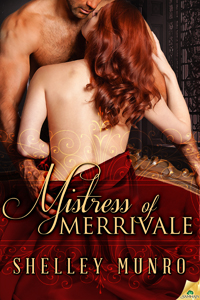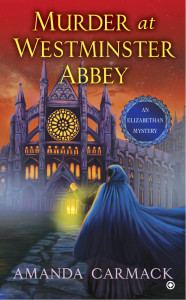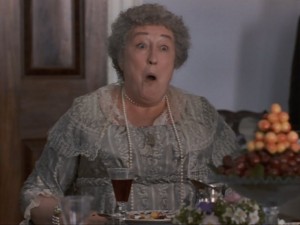 Today we welcome Shelley Munro and her new release Mistress of Merrivale to the Riskies. Shelley is giving away two digital copies of one of her historical backlist books, and there are a zillion ways to enter (see below!)
Today we welcome Shelley Munro and her new release Mistress of Merrivale to the Riskies. Shelley is giving away two digital copies of one of her historical backlist books, and there are a zillion ways to enter (see below!)
A marriage of convenience…full of inconvenient secrets.
Jocelyn Townsend’s life as a courtesan bears no resemblance to the life she envisioned in girlish dreams. But it allows her and her eccentric mother to live in relative security—until her protector marries and no longer requires her services.
Desperate to find a new benefactor, one kind enough to accept her mother’s increasingly mad flights of fancy, Jocelyn is nearly overwhelmed with uncertainty when a lifeline comes from an unexpected source.
Leo Sherbourne’s requirements for a wife are few. She must mother his young daughter, run his household, and warm his bed. All in a calm, dignified manner with a full measure of common sense. After his late wife’s histrionics and infidelity, he craves a simpler, quieter life.
As they embark on their arrangement, Leo and Jocelyn discover an attraction that heats their bedroom and a mutual admiration that warms their days. But it isn’t long before gossip regarding the fate of Leo’s first wife, and his frequent, unexplained absences, make Jocelyn wonder if the secrets of Merrivale Manor are rooted in murder…
Warning: Contains mysterious incidents, a mad mother who screeches without provocation, scheming relatives, and a captivating husband who blows scorching hot and suspiciously cold. All is not as it seems…and isn’t that delicious?
OK, I’ll bite. Tell us about the screeching mother.
Thanks so much for having me to visit today.
Jocelyn’s mother has a form of dementia, a disease that would be diagnosed as Alzheimer’s during our modern times. Her memory is gradually going, and her behavior is becoming erratic. Jocelyn’s two older sisters want to send Elizabeth Townsend to Bedlam, but Jocelyn hates the thought of her mother in a place like that, and she takes measures to keep her remaining parent safe with her.
Elizabeth isn’t above screaming when she wants attention, and she screeches when she doesn’t get her way. She’s very trying at times, yet Jocelyn gets the odd glimpses of her mother of old and she keeps hoping her parent will improve. She never does.
You’ve written so many books and in so many subgenres–what got you into writing historicals?
My first love as a reader was always historical romances, but gradually I started reading other genres. Once I started writing, I followed the same path. I tend to get bored writing the same genre all the time. While this isn’t the best plan, I need to enjoy the process of writing too, hence my dipping into the historical romance arena.
I do have a super-secret idea for a new historical series, and I hope to start working on that later in the year.
What is it that attracts you about the Regency?
My favored period is actually the 18th century, which I like because I think they were a little naughtier than the Regency era. It was a time of great change, which makes it interesting, and lastly, I adore the clothes.
You have a courtesan heroine. How difficult was it to make this trope fresh?
I didn’t think about making the trope fresh. It was more a case of writing my heroine the way I thought she should be written, and my story, the Mistress of Merrivale, emerged. Can you tell I’m a pantser rather than a plotter?
What’s your favorite scene in the book?
I like the scene when Leo and Jocelyn have their first meal together after being reunited and consummate their marriage. They both want their marriage, and they’re attracted to each other, but everything is new and strange for both of them. This makes for fun scene as they learn about each other.
What was the most difficult part of the book to write?
When I first wrote this book it ended up at just over 50K words. I subbed it to one of my editors and received a rejection. I never give up, and I liked this story a lot. Since I was about to go on holiday, I set the story aside. On my return I reread it, and decided I needed more plot to make the story stronger and be true to my characters. In the end Mistress of Merrivale ended up at 86K words. Working out what to add and how to do it was the tough bit, but it was worth it. I’m pleased with the end result.
What are you working on right now?
I’m percolating my super-secret historical series idea in my head while I’m working on a sci-fi series which is contracted with another publisher. I’m busy writing the third book in this series and the words are stuck in a swamp in the depths of my brain. At least that’s what it feels like today!
What are you reading right now/last great book you read?
I’m listening to an audio book at present – Shades of Gray by Maya Banks. As for the last great book I read, I can’t tell you the name of the author or the title since it was one of the books I judged in the RITA. I love it when I discover new authors, especially if they come with a back list!
Your task: Enter the contest via the magic of Rafflecopter, or ask Shelley a question about her book, or, since she lives in New Zealand, you could ask her about, for instance, rugby players. Or Lord of the Rings. Or, share with us a new author you’ve discovered recently.


![Megan[4]](https://authors.riskyregencies.com/wp-content/uploads/2014/03/Megan4-300x199.jpg)


